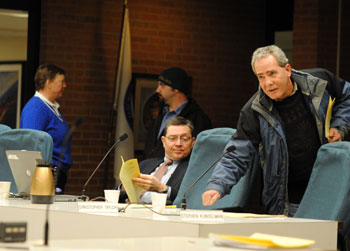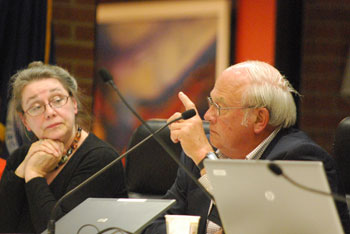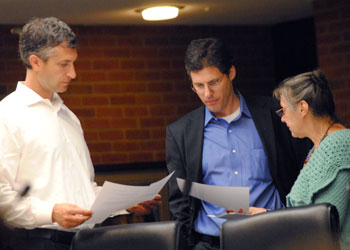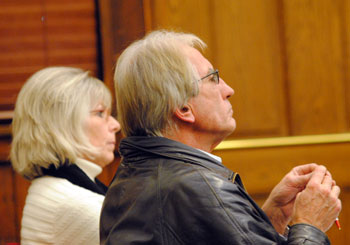Ann Arbor City Council meeting (Dec. 6, 2010): Five different presentations, plus a full roster of public commentary, meant that two and a half hours into their meeting the Ann Arbor city council had not transacted any business – except for adopting its rules for the next year.

Before the meeting started, Scott Rosencrans, right, knocks on wood in conversation with Stephen Rapundalo (Ward 2). Behind them are Sandi Smith (Ward 1) and Nicholas Nightwine, president of the city's AFSCME union Local 369. Nightwine was there to oppose the outsourcing of city composting operations. Rosencrans, former chair of the park advisory commission, attended as part of a presentation made by the Ann Arbor Skatepark. (Photos by the writer.)
Council rules factored prominently later in the meeting, when a motion to suspend them failed. Had the rules been suspended, it would have cleared the way for the council to reconsider their previous decision to reject a residential planned unit development (PUD) on Fifth Avenue – Heritage Row. The project, which began as a conditional rezoning proposal three years ago, went through iterations since 2007 that included a brownstone-style PUD and a matter-of-right proposal called City Place, which eventually did win approval from the council.
After their previous council meeting, which featured water as a prominent theme, the council focused much of its attention on land-related issues like Heritage Row. In another land-use related item, the council approved revisions to the city’s area, height and placement (AHP) zoning provisions in the city code. But amendments to the AHP resolution were substantive enough that the approval process was reset to the initial, first-reading step. The AHP changes – which, as amended, provide that height limits do not apply in so-called “employment districts,” unless they abut residential areas – will need approval at a second reading in order to be enacted.
A land-use item that was intended mostly as administrative housekeeping – several park areas previously designated as residential, office, and business districts were rezoned with the public land (PL) designation – generated substantial public commentary and council deliberations. Several public commenters expressed concern about whether the PL designations, which the council approved, afforded adequate protection for the continued use of the land as parks.
Although not strictly a land-use issue in a zoning sense, a proposed contract with WeCare Organics to operate the city’s compost facility was linked to terra firma by acreage owned by the city where the facility is located, plus the fact that it processes yard waste generated from residents’ property. The council approved the WeCare contract after extended questioning of city staff and a representative from WeCare.
Also tangentially related to land use was an item that introduced a licensing scheme for medical marijuana dispensaries and cultivation facilities in the city. After questioning the city attorney about several provisions of his proposed licensing requirements, councilmembers decided to postpone the issue until their Jan. 3, 2011 meeting. The new zoning regulations regarding where medical marijuana dispensaries and cultivation facilities can be located, which were scheduled to be heard at second reading on Dec. 20, were rescheduled for Jan. 18.
A land travel-related agenda item the adoption of the Michigan Vehicle Code (MVC) as part of the city’s traffic ordinances. Two years ago, the city had adopted the MVC but excluded portions of that state law relating to the setting of speed limits. The adoption of the full MVC came in response to a possible class-action lawsuit against the city.
As heavily land-centric as the agenda was, Ann Arbor city council also dealt with $9 million worth of water issues. It approved petitions of the Washtenaw County Water Resources Commissioner (WCWRC) office for five different projects in drainage districts that lie at least partly inside the city of Ann Arbor. The total cost of all the projects, including the non-city share, is a bit over $9 million. They qualify for low-interest state-revolving fund loans, up to 50% of which may be forgiven by the state. The payments on the loans will come from the city’s stormwater fund. [Full Story]








